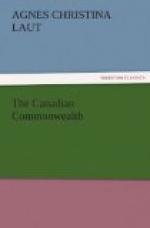If the coming of the foreigner has been Canada’s greatest danger from within, the coming of the Oriental has been one of her most perplexing problems from without. It is not only a perplexity to herself. It is a perplexity in which Canada involves the empire.
Take the three great Oriental peoples! With China, Great Britain is in friendly agreement. With Japan, Great Britain is in closest international pact. To India, Great Britain is a Mother. Yet Canada refuses free admission to peoples from all three countries. Why? For the same reason as do South Africa and Australia. It is only secondarily a question of labor. The thing goes deeper than that.
Consider Japan first: Panama is turning every port facing west into a front door instead of a back door. Within twenty years, the combined populations of American ports on the Pacific have jumped from a few hundreds of thousands at San Francisco and nothing elsewhere to almost two million, with growth continuing at an accelerated rate promising within another quarter of a century as many great harbors of almost as great population on the Pacific as on the Atlantic. The Orient has suddenly awakened. It is importing something besides missionaries. It is buying American and Canadian steel, American and Canadian wool, American and Canadian wheat, American and Canadian machinery, American and Canadian dressed lumber. Ship owners on the Pacific report that the docks of through traffic are literally jammed with goods outward bound—“more goods than we have ships,” as the president of one line testified.
When the reason for building Panama has been shorn of highfalutin metaphors, it concentrates down to the simple bald fact that the United States possessions on the Pacific had grown too valuable to be guarded by a navy ten thousand miles away around the Horn. True, Roosevelt sent the fleet around the world to show what it could do, and the country howled its jubilation over the fact. But the Little Brown Brother only smiled; for the fleet hadn’t coal to steam five hundred miles without hiring foreign colliers to follow around with supply of fuel. “Fine fleet! To be sure we have the ships,” exploded a rear admiral in San Diego Bay a few years ago; “but look here!” He pointed through the port at an insignificant coaling dock such as third-rate barges use. “See any coal?” he asked. “If trouble should come”—it was just after the flight of Diaz—“we haven’t coal enough to go half-way up or down the coast.”
II
Sometimes we can guess the game from the moves of the chess players. With facts for chessmen, what are the moves?




